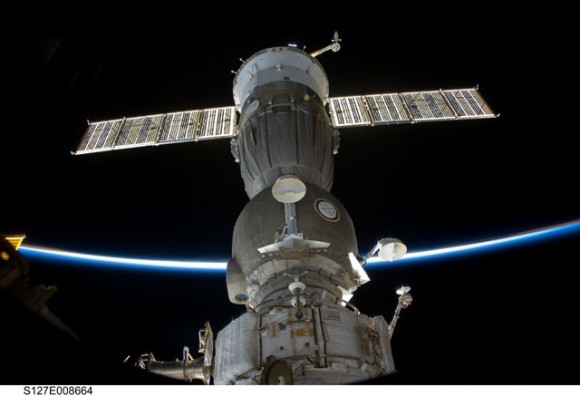If NASA fails to launch Atlantis on time, it could be tangled up with a new Soyuz arriving at the station, satellite launches from Cape Canaveral, and even meteor showers

The International Space Station is starting to feel and look like a busy space station, with three Soyuz spacecraft docked at the same time, and a crew of three.
As a reminder, on Friday the 21st crew members Jeffrey Williams and Maxim Surayev arrived, together with space tourist Guy Laliberta in the Soyuz TMA-16 spacecraft docked at the rear of the Zvezda service component. Williams and Surayev will replace Gennady Padalaka and Michael Barrett who will return in their spacecraft - Soyuz TMA-15 on October 10 together with Laliberta.
A third Soyuz - TMA-14 is waiting for the other three crew members in case a rescue is needed.
And in the meantime, NASA announced that two planned launches, a window of time that is too small for the shuttle, a traffic collision at the space station and two meteorites could cause a delay of two months in the launch of the shuttle Atlantis. Currently, NASA is focusing on the planned launch date, November 12 and preparing the shuttle for transfer to the assembly facility at the Kennedy Space Center today (Tuesday).
Atlantis and its six crew members are scheduled to lift off on November 12 and bring many spare parts to the space station. NASA will have only eight days for this operation. The angle of the sun on the station from November 21st to December 5th will not allow the station to generate enough power or remove a thermal breaker to support the shuttle as well. A delay beyond November 20 could push the spacecraft into a one-week launch window that opens on December 6, and in any case Atlantis will have to evacuate the station before a new Russian Soyuz spacecraft arrives on December 23 with some of the members of the 22nd crew that Williams will command (the crew The current 21st is commanding for the first time an astronaut who is not American or Russian - the Belgian Frank de Wien).
If Atlantis does not lift off by December 14th, the launch will be delayed to January 7th. It is not possible to leave the shuttle in space at the beginning of a year because its computers are not built to last a year. Two commercial launches are also planned at Cape Canaveral - the Atlas 5 rocket from the United Launch Services Company is supposed to launch communication satellites into space on November 14, and on the 18th the Delta 4 rocket will launch an unspecified payload for the US Air Force. 24-48 hours are needed between successive launches. Therefore NASA must meet the November 12 deadline.
Another problem is that it is not possible to launch during a meteor shower when the Geminids will peak on December 13-14 and the Leonids will do so on the 17th. In 1993, NASA delayed the launch of Discovery because of a particularly strong record of the Perseid meteor shower.

One response
What is the story with the computers that are not built to last a year? Let them move the calendar on the computers a few months forward or backward...